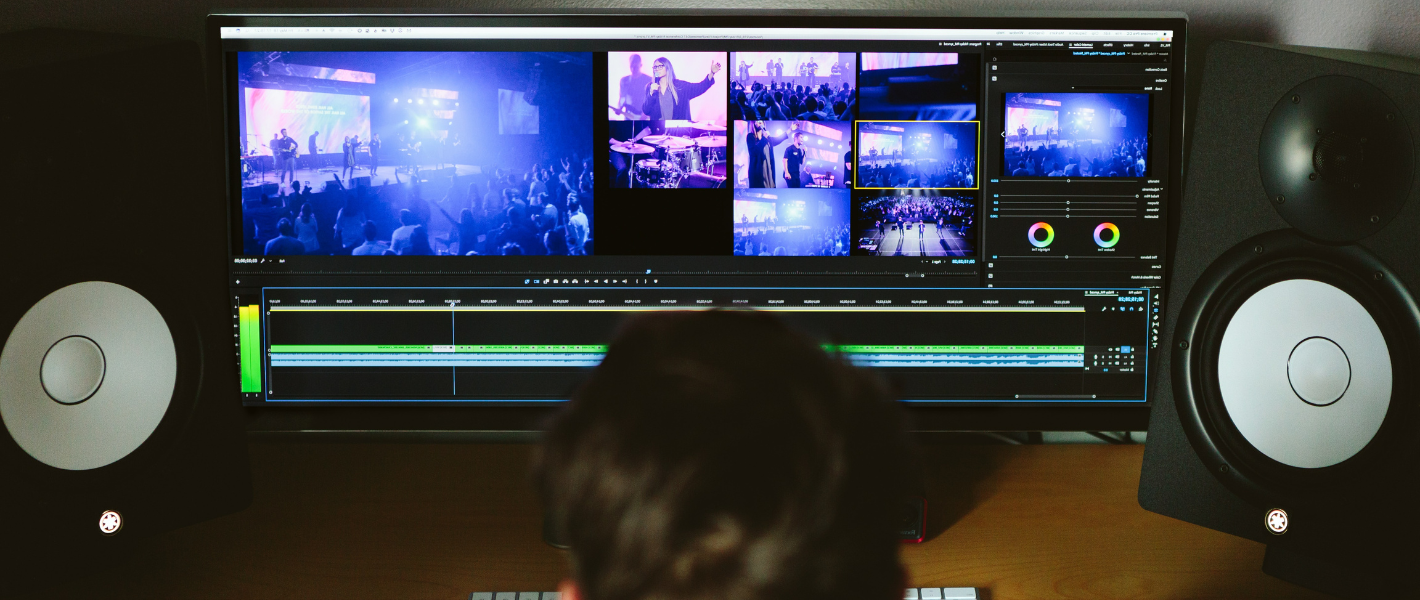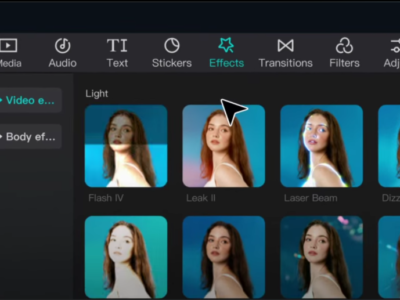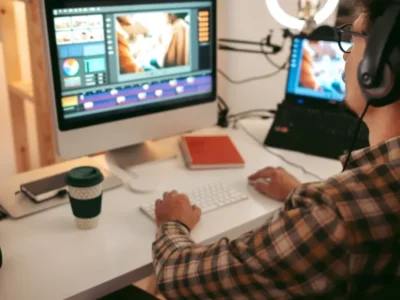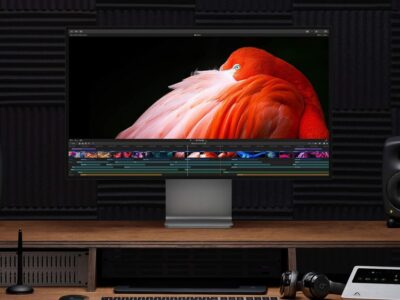Video editing is an evolving career with huge potential for growth. And the best part is, you don’t even need a fancy software or design degree to become a video editor. All you need is the right training and some basic equipment. In this post, we will talk about how to become a video editor and what are the skills you should learn.
Read on, because it doesn’t matter whether you just have completed your undergraduate degree or already served an industry for years, video editing is a skill that can open doors for you in this digital age. Where 86% of businesses are already using video as a marketing tool, your chances of landing good jobs are super high!

What Does a Video Editor Do?
Broadly speaking, a video editor is an artist who carefully arranges footage to create a story in video format. They add visual effects and manipulate timing, transitions, and audio to bring raw video material to life.
The role of a video editor requires a lot of attention and creativity. Basically, it’s a process of manipulating and rearranging video shots to create a new work. What a professional video editor does is that he picks out the best shots. Then, he added some music, sound effects, and other visual elements to make the final video engaging for the audience.
Being a video editor calls for a whole lot of focus and imagination. It comes down to messing with and reorganizing video clips to make something new, and professional video editors pick out the best shots and then throw in some tunes, sound effects, and other visual stuff to keep viewers interested in the end result.
Industries you’ll have a chance to provide your video editing services include:
- TV production
- Film production
- Music Industry
- Education Sector
- Marketing
- Manufacturing
- Real Estate
- Healthcare
- Online video and social platforms
Steps to Start your Video Editing Career
Here are some easy steps to start your Video editing career.
1. Learn the Basics
First of all, you need to learn the basics of video editing. There is no need to buy fancy equipment or expensive software to start learning. You can also use your smartphone or laptop to practice your video editing skills. And for editing software, there are plenty of free video editing apps available that you can use to get started.
Learning the basics will not take much time. If you learn actively, it’ll hardly take 2-3 days to learn all the basics of video editing. Once you get the idea of all video editing basics, you can move to the next steps.
Online platforms such as YouTube and courses on Linda, Udemy, or Skillshare become valuable soundstages for those eager to grasp the basics. Even if your experience thus far involves crafting short clips or weaving tales on social media, rest assured, you likely possess more film editing prowess than you might give yourself credit for.
You can find free courses for video editors in our article “How to Become a Video Editor“.
2. Choose the Right Video Editing Software
Next, it’s time to choose the right video editing software to practice your skills. Many options are available, but it’s important to choose one that’s user-friendly and offers the features you need to create professional-looking videos. Some popular options that we also found worth checking include iMovie, Adobe Premiere Pro, and Final Cut Pro.
You can also start with more basic video editing software like Descript or Filmora. They are quite budget-friendly compared to Adobe Premiere Pro or Final Cut Pro.
3. Use Your Creativity
Now, you already have your software and equipment in place. So, it’s time to get to the fun part: using your creativity!
Gather all the footage and images in one place. Then, craft a story that you want to tell with your video. Figure out what is the best way to bring your story to life. You can experiment with different shots, transitions, and special effects to find the best ones for your story.
Start by directing your focus towards simple film projects, gradually increasing the complexity of your endeavors. This hands-on experience not only sharpens your skills but also lays the foundation for building a reel—a testament to your creative journey. Internships, passion projects, and school assignments become the takes in your reel, propelling you toward a compelling demo showcasing your editing prowess.
4. Learn Visual Storytelling
If you really want to become a professional video editor, technical skills are not enough. You also need to work in your storytelling skills. Learn how to tell a story through visuals by analyzing scripts or footage and identifying key elements.
Pay attention to pacing, composition, and visual dynamics to evoke emotions from your audience. Every cut and transition you add should contribute to the flow of your story.
5. Develop an Eye for Detail
Attention to detail is what sets great video editors apart from mediocre ones. Train your eye to spot imperfections, inconsistencies, or distractions in the footage. You cannot just edit a video and expect it to be perfect, you have to work on small details to make it look professional.
Focus on color correction, enhancing audio, and maintaining a cohesive visual style. Make sure everything is aligned properly, even if only by a few pixels.
Become a Filmmaker FREE eBook
In this Free 99 pages PDF file, you will find:
✔️ Camera Settings
✔️ Lighting
✔️ Directing
✔️ Post-Production
✔️ Website & online presence
✔️ and more

6. Seek Feedback and Collaborate with Professionals
In the vast landscape of film editing, seeking guidance from seasoned professionals becomes paramount. Don’t shy away from asking for feedback from experienced filmmakers or fellow novices—each piece of advice acts as a guiding light. Collaborating with other filmmakers, cinematographers, or editors becomes your film set, guiding you through uncharted scenes and exposing you to new techniques. It’s also a tremendous opportunity to network and build relationships within the industry.
As a video editor, you can either work on your own projects or partner with other creatives on big projects. Collaborating with others can teach you new skills, spark creativity, and give you networking opportunities.
Work on projects with professional video editors who are in this editing game way before you. You’ll be amazed by all the tips and techniques you’ll learn from them!
7. Build a Robust Portfolio
Consider your portfolio as the reel—a compilation of your best scenes and a powerful tool to showcase your capabilities. Craft a portfolio housing your finest work and showcase it on your website, social media platforms, or dedicated portfolio sites like Behance or Vimeo. A compelling portfolio acts as a spotlight, attracting potential collaborators and employers to your creative set.
8. Develop Soft Skills
While technical proficiency is the vessel that carries you forward, the lights are dimmed by soft skills. Time management, organization, creativity, communication, and storytelling act as the lighting crew, illuminating your path toward success in the competitive sets of film editing.
9. Time Management
As you navigate the dynamic scenes of film editing, mastering the art of estimating project timelines and delivering work promptly becomes a crucial skill. Meeting deadlines isn’t merely a task—it’s the spotlight that guides your scene, building client trust and forging a stellar reputation.
10. Organization
In the ever-expanding universe of film projects, cultivating meticulous file labeling and organization becomes your production blueprint. Early adoption of this habit pays dividends when dealing with larger and intricate assignments, preventing your production from getting lost in the sea of files.
11. Creativity
Creativity becomes the lifeblood of your journey—a skill to be nurtured and cultivated. Enhance your problem-solving abilities and cultivate an active imagination. Engage in diverse projects, read industry literature, and partake in activities that fuel the fires of your creativity.
12. Communication
Effective communication is the script that guides your film through the complexities of the industry. Overcommunication becomes your ally—providing regular updates, confirming details, and ensuring that you and your collaborators are on the same script.
13. Storytelling
In the vast narrative of your film editing journey, storytelling emerges as a skill that sets you apart from the rest. While some may possess a natural talent for storytelling, exposure to diverse film genres, scripts, and cinematography styles serves as the script guiding your narrative skills. Embrace opportunities to craft compelling tales through your edits.
Never Stop Your Learning Journey
Video editors are found in almost every media company. And with new techniques and technologies emerging every other day, there’s always something new to learn. As a newbie, you can start your career by working on student projects. You can also land editing projects from small production houses to polish your skills.
But as soon as you become more proficient in your editing skills, then do your best to hunt the big whales. You can choose to work as a full-time video editor with production houses or even mega studios. And who is stopping you from opening your own advertising firm?
Anything is possible if you try!
But to achieve all this, you have to adopt learning as your habit. Stay updated on industry trends, watch tutorials, and enroll in advanced courses, do everything that makes you stand tall!
Surround yourself with a community of fellow video editors who can provide feedback and support. Additionally, practice your skills regularly through personal projects or collaborations.
Takeaway
Video editing can open doors to a career where creativity and technology come together. However, success as a video editor comes not just from mastering software but also from your ability to captivate and inspire viewers through your creativity and storytelling skills. Follow the above steps to become a video editor so you can use your imagination and passion for storytelling to pursue a rewarding career.
Become a Filmmaker FREE eBook
In this Free 99 pages PDF file, you will find:
✔️ Camera Settings
✔️ Lighting
✔️ Directing
✔️ Post-Production
✔️ Website & online presence
✔️ and more

Explore related content

Video Editing Tips CapCut: Tips, Tricks, and Techniques
Video editing is an art, and there are proper tools and techniques, through them everybody… Read More »Video Editing Tips CapCut: Tips, Tricks, and Techniques

Factors to Consider Before Buying a Video Editing Computer
From helping grow your brand and business to editing just for fun with the love… Read More »Factors to Consider Before Buying a Video Editing Computer

Best Video Editing Monitors in 2024
In the evolving world of video production, the importance of a high-quality monitor cannot be… Read More »Best Video Editing Monitors in 2024